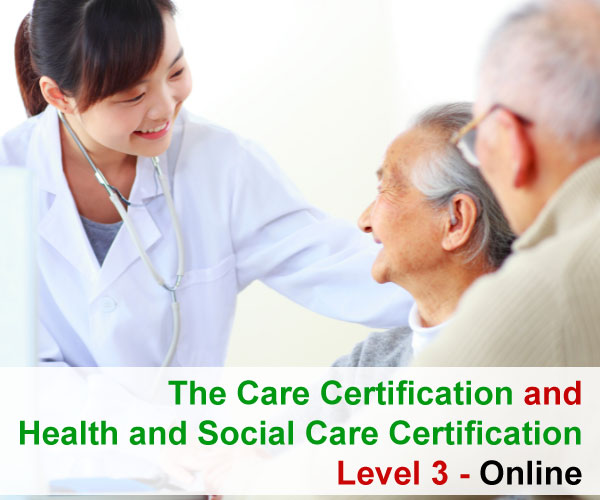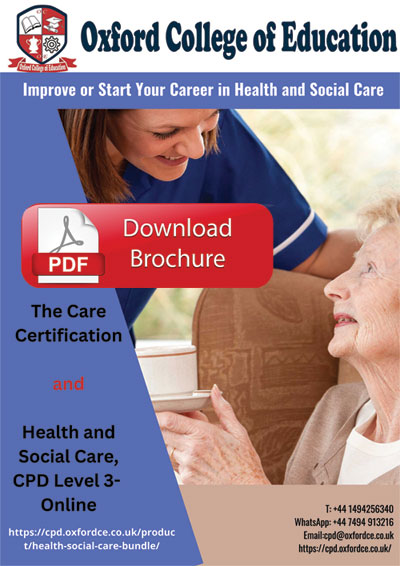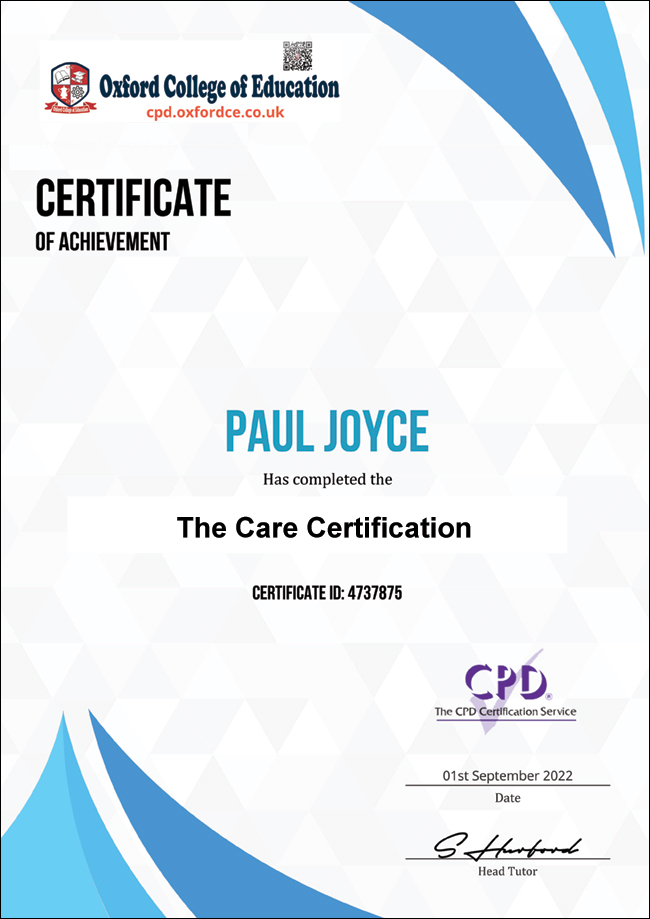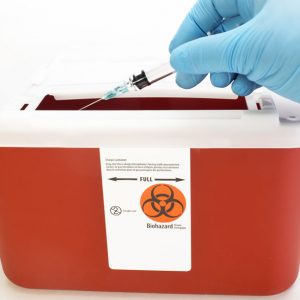The Care Certification and Health and Social Care Certification Level 3- Online
AT A GLANCE
What is included:
- Course Completion Certificate
- Interactive Course Materials (Video, PDF, Images, References)
- 3 Exam Retakes
- Support via Email or WhatsApp
- Course Access: 12 Months
Course Length
This flexible online course lets you learn at your own pace, completing it in days or weeks based on your schedule. For example, if the course includes 10 modules with 4 topics each, you could complete it in a single day by staying focused and studying continuously. Alternatively, you could finish one module per day, completing the course in 10 days. The choice is yours!
Global Recognition and Awards: Our courses have gained global recognition and multiple awards, attesting to their quality and effectiveness.
Inside the course: Throughout the course, you will engage with the content through reading, video (if available), and various activities and assessments. Each course includes all assessments, allowing you to assess your understanding as you progress through the material. At the end of each module or unit, you will be required to complete an assessment test. These tests are automatically graded, giving you immediate feedback on the correctness of your answers.
1- Study Method: Online
2- Log in Access: After you pay, we will register you for the course and then send you the login access.
3. Exam system and Pass Mark: Multiple Choice Exam with an 80% Pass Mark
4. Fast Exam Type: Online Multiple-Choice Assessment, almost all modules have quizzes and a maximum of 3 attempts are allowed. The passing mark is 80%.
5. Exam Fees: The Exam Is Included in the Price
6. Exam Retakes: 3 Times Retakes at No Extra Cost
7. FastTrack: Free
8. Qualification Type: CPD (Continuing Professional Development)
9. Credit: CPD Credit (See Our FAQs - https://cpd.oxfordce.co.uk/cpd-faqs/)
10. Online Interactive User-Friendly Course
11. 24 Hours Course Access, 365 Days of the Year
12- What are CPD points, hours, units and credits?
SEE QUESTION NO 30
https://cpd.oxfordce.co.uk/cpd-faqs/
13- Study Anywhere/Anytime: Study the Course Anywhere/Anytime on PC, Mobile, and Tablet. You Can Even Learn on Your Way to Work
14- This Assists You to Advance in Your Career and Move into New Positions Where You Can Lead, Manage, Influence, Coach, and Mentor Others
15- Do employers consider CPD certificates?
SEE QUESTION NO 38
https://cpd.oxfordce.co.uk/cpd-faqs/
16- Can I Get a Job with a CPD Certificate?
SEE QUESTION NO 37
https://cpd.oxfordce.co.uk/cpd-faqs/
17- Will the Universities accept CPD certificates?
SEE QUESTION NO 29
https://cpd.oxfordce.co.uk/cpd-faqs/
18- Is CPD Equivalent to NVQ Qualification?
SEE QUESTION NO 27
https://cpd.oxfordce.co.uk/cpd-faqs/
.....
AT A GLANCE
What is included:
- Course Completion Certificate
- Interactive Course Materials (Video, PDF, Images, References)
- 3 Exam Retakes
- Support via Email or WhatsApp
- Course Access: 12 Months
Course Length
This flexible online course lets you learn at your own pace, completing it in days or weeks based on your schedule. For example, if the course includes 10 modules with 4 topics each, you could complete it in a single day by staying focused and studying continuously. Alternatively, you could finish one module per day, completing the course in 10 days. The choice is yours!
Global Recognition and Awards: Our courses have gained global recognition and multiple awards, attesting to their quality and effectiveness.
Inside the course: Throughout the course, you will engage with the content through reading, video (if available), and various activities and assessments. Each course includes all assessments, allowing you to assess your understanding as you progress through the material. At the end of each module or unit, you will be required to complete an assessment test. These tests are automatically graded, giving you immediate feedback on the correctness of your answers.
1- Study Method: Online
2- Log in Access: After you pay, we will register you for the course and then send you the login access.
3. Exam system and Pass Mark: Multiple Choice Exam with an 80% Pass Mark
4. Fast Exam Type: Online Multiple-Choice Assessment, almost all modules have quizzes and a maximum of 3 attempts are allowed. The passing mark is 80%.
5. Exam Fees: The Exam Is Included in the Price
6. Exam Retakes: 3 Times Retakes at No Extra Cost
7. FastTrack: Free
8. Qualification Type: CPD (Continuing Professional Development)
9. Credit: CPD Credit (See Our FAQs - https://cpd.oxfordce.co.uk/cpd-faqs/)
10. Online Interactive User-Friendly Course
11. 24 Hours Course Access, 365 Days of the Year
12- What are CPD points, hours, units and credits?
SEE QUESTION NO 30
https://cpd.oxfordce.co.uk/cpd-faqs/
13- Study Anywhere/Anytime: Study the Course Anywhere/Anytime on PC, Mobile, and Tablet. You Can Even Learn on Your Way to Work
14- This Assists You to Advance in Your Career and Move into New Positions Where You Can Lead, Manage, Influence, Coach, and Mentor Others
15- Do employers consider CPD certificates?
SEE QUESTION NO 38
https://cpd.oxfordce.co.uk/cpd-faqs/
16- Can I Get a Job with a CPD Certificate?
SEE QUESTION NO 37
https://cpd.oxfordce.co.uk/cpd-faqs/
17- Will the Universities accept CPD certificates?
SEE QUESTION NO 29
https://cpd.oxfordce.co.uk/cpd-faqs/
18- Is CPD Equivalent to NVQ Qualification?
SEE QUESTION NO 27
https://cpd.oxfordce.co.uk/cpd-faqs/
.....
The Care Certification
The Care Certification is an identified set of standards that health and social care workers should strive to adhere to in their daily life. It was developed so that all workers obtain the same introductory skills and knowledge to enable them to provide compassionate, safe, and high-quality care and support.
Care Certification training is an essential part of any health or social care role. This course is appropriate for anyone new to the industry, currently employed as an adult social care worker or someone who provides direct care in a residential home, nursing home, hospice or in the patient’s own home.
It includes information about typical duties, personal development and working in a person-centred way, along with other systems for managing your ability to provide the best possible care across the fifteen modules.
You will Learn:
-
What is meant by duty of care, the importance of effective communication and the responsibilities surrounding safeguarding both adults and children
-
Information about discrimination and equality, including the protected characteristics
-
Privacy and dignity preservation, including information regarding confidentiality, handling sensitive information and the UK GDPR principles
-
Food safety regulations and the importance of good nutrition and hydration
-
Information about common mental health conditions, dementia, learning disabilities and how to determine mental capacity
-
Basic life support and Health and Safety standards
Benefits of Taking this Course:
-
Develop your skills as a health or social care worker
-
Gain an insight into what it takes to deliver the best possible care
-
Open the door to furthering your education
Who Should Take The Care Certificate Online Course?
Care Certificate is ideal for individuals who are working or want to work:
-
Healthcare Assistant
-
Support worker
-
Paediatric Nurse
-
Child Support Worker
-
Child & Adolescent Psychologist
-
Foster Care Worker
-
Nurses and Junior Doctors may refresh their knowledge
Course Modules/Lessons:
-
The typical duties that will be reqired of your role, and what you need to personally bring in terms of your attitude, demeanour and behaviour
-
The definition of company values, aims and objectives
-
Information regarding yor rights at work, including health and safety, working conditions, agreed ways of working, reporting errors and whistleblowing
-
What a Personal Development Plan (PDP) is and what should be included in it
-
How to make SMART goals and objectives
-
The difference between supervisions and appraisals, and the core skills needed for you to succeed in your role
-
What is meant by duty of care, what your responsibilities are to upholding it, and who you have duty of care to
-
Ways to promote wellbeing and support the independence of those you work with
-
How to best deal with complaints, conflicts, incidents and near misses, and the legislation that sets out the regulations for such events
-
Ways to improve your attitude towards equality and diversity and what to do if you witness an act of discrimination
-
What is meant by ‘person-centred working’ and the core values that go alongside this, including “The 6 Cs” and these values in practice.
-
Information regarding care plans and why these are so important in providing optimum levels of care and support
-
Ways in which to avoid distress and environmental factors that can cause discomfort to residents and patients
-
Why communication is essential in the healthcare sector
-
The various types of communication and how the nonverbal types can be indicative of emotions and feelings
-
The difference between informal and formal communication and the situations where each of these is appropriate
-
Some of the barriers that prevent good communication and how you can reduce these
-
The meaning of the term ‘privacy’ and ‘dignity’ and how these can be preserved
-
The regulations surrounding the privacy of information and confidentiality, and ways in which you can ensure these are followed
-
How privacy and dignity can be maintained in health and social care, and the role that wellbeing has on this
-
What a risk assessment is, and what it should consist of
-
Information about dementia and learning disabilities
-
The importance of early diagnoses
-
How to determine mental capacity, and the legislation surrounding mental health, dementia and learning disabilities
-
Information about common mental health conditions such as depression, anxiety and psychosis, and the signs and symptoms of these
-
Information about dementia and learning disabilities
-
The importance of early diagnoses
-
How to determine mental capacity, and the legislation surrounding mental health, dementia and learning disabilities
-
The 10 different types of abuse and the signs and indicators of these
-
The principles of safeguarding and risk enablement
-
SARs and what to do if you suspect abuse is occurring or will occur in the near future
-
The various forms of child abuse, and the common signs and indicators to look out for in order to be able to recognise them
-
Children’s rights, and the legislation surrounding this
-
Your responsibilities in safeguarding children, and information on what to do when you suspect abuse is occurring
-
The three elements of basic life support, including the primary survey, airway maintenance and CPR
-
The acronym DR ABCD and what each step should entail
-
Information about the proper administration of CPR
-
How to deal with an obstruction to the airway in adults, and how this differs from what you need to do for an infant or a child
-
Who is responsible for ensuring safety in the workplace
-
How to deal with first aid situations, accidents and sudden illness
-
Tasks that may require specialised training
-
How the standards of ensuring good health and safety can lead to stress – as well as how you can deal with stress to promote a healthy, error-free workplace
-
Where, when, and how you should handle private information in the workplace
-
How to tell what to share and record, by considering the Six Principles of UK GDPR
-
What pathogens are and how infections are caused
-
The ‘Chain of Infection’ by which pathogens are transmitted
-
The preventative measures you can take to break the chain
Health and Social Care Certification Level 3
If your company aims to help people and make a difference or you believe that there are some employees within your organisation who would benefit from adding some new skills to their repertoire, a certification in health and social care is a great place to start.
Having the knowledge required, in order to provide care and basic medical attention is necessary, if your team members have an aspiration to achieve a rewarding career in health and social care.
Regardless of the segment of the care sector that your organisation fits into, this course will fit your employees’ needs.
As this course is offered entirely over the internet, this will allow your staff the freedom to study from anywhere and at any time that suits them. By studying these 19 modules, they’ll quickly be able to grasp what it takes to become capable in the field of health and social care.
What’s Covered in the Course?
The Health and Social Care Certificate course was created to give students all they require to step into this thriving industry.
Upon completing the course, you can decide if the role of a carer is right for you, or whether you want to seek out further educational opportunities in the carer field. The carer course covers the following:
-
The laws and regulations that are applicable to those who work in healthcare;
-
What a carer is and how they influence the economy;
-
An introduction to the important publication: ‘The National Carers Strategy’;
-
How to properly handle heavy loads manually, in order to avoid injury;
-
Who vulnerable adults are and the tools available, in order to help keep them safe;
-
How infections spread and what your team members can do, in order to avoid them;
-
The proper way in which to perform CPR and how this invaluable tool can help save lives;
-
How to operate a defibrillator, when someone is going into cardiac arrest;
-
The countless mental illnesses that an individual can suffer from and how the mental health field is rapidly evolving;
-
The regulations in place, when it comes to carers working with children.
What are the Benefits of the Course?
When completing this course, there are a range of benefits that employees can look forward to, including:
-
Teaching their colleagues how to provide basic medical care in an emergency situation;
-
The ability to study from any place, 24/7;
-
Upon completion of the course, your employee will receive a fully-accredited certificate, and this adds extra credibility to your business;
-
Online support offered with the course.
Course Modules/Lessons:
-
The legislations involved in the provision of care (some specific to manual handling)
-
The regulatory authorities applicable to different regions
-
The variety of manual handling aids used to move people safely
What’s involved in risk assessments
-
Discover key legislations in place to actively support carers in the community
-
The definition of a carer
-
The impact carers have on the economy
-
What the National Carers Strategy is (and why it is unlikely to change priorities)
-
Learn how manual handling aids can lower the amount of force required to just 2% of the load weight
-
The safest methods to transport any heavy and bulky objects with minimum risk of injury
-
What every employer does to minimise harm from manual handling activities
-
What the law lays down for employers and employees to comply with for a safe workplace
-
About the impact of the Care Act 2014 on Care Workers
-
The definitions of vulnerable adults and what can constitute abuse
-
The significance of the No Secrets Document
-
The 6 key principles of safeguarding vulnerable adults
-
How fires start and spread
-
The six classifications of fires
-
The different types of firefighting equipment and extinguishers used for each classification of fire
-
Handling oxygen safely in care environments, including with home care service users
-
Discover the five critical areas for maximum infection control measures
-
The legal requirements for working with clinical sharps
-
The organisation responsible for issuing the quality standard guidelines that all healthcare workers must adhere to
-
The risks of poor infection control
-
Learn about the types of first aid certification for first aiders
-
The core legislations surrounding health and safety, including why care workers are partially exempt from the Working Time Regulations
-
Who is responsible for what
-
The reporting procedures to follow should any accidents occur
-
Discover the two mnemonics that’ll help you remember how to save someone’s life
-
What the acronym F.A.S.T. means and why it’s crucial to remember
-
How to perform crucial lifesaving CPR
-
What a defibrillator does and why you can’t delay using one when someone is experiencing a cardiac arrest
-
Learn about the national legislations that all food business operators are required to abide by
-
How Environmental Health Officers enforce the legislations at a local level
-
The danger zone temperatures food should be kept out of and the methods used to do that
-
Food safety considerations for all carers whether you work in home support services or a residential care home – you need to know how to protect clients from harm
-
Discover the 16 pivotal pieces of information contained in Safety Data Sheets;
-
How the EU Market works to safeguard public health from hazardous chemicals;
-
The new GHS Hazard Pictograms;
-
Everything you need to know about the COSHH 2002 Regulations;
-
Discover all the steps required for an effective communication process;
-
The barriers that will hinder any attempt to deliver a message to someone;
-
What active listening is and how you can apply it to all areas of your life;
-
What is involved in verbal and non-verbal communication;
-
Learn the fundamentals of the Mental Capacity Act 2005 (MCA) (England and Wales), The MCA NI 2016 (Northern Ireland) and the Adults with Incapacity Act 2000 (Scotland);
-
Know what the Depravation of Liberty is and why it is important for carers to understand;
-
Master the five principles underpinning the Code of Practice for The Mental Capacity Actnow exactly why on on Human Rightsat the power to do so themselves, dless of hte and the Adults with Incapacity Act;
-
Gain clarity on exactly what ‘lacking capacity’ means and how capacity is assessed;
-
Learn the three groups of mental disorders;
-
The wide variety of mental illnesses within each group;
-
Gain clarity about what exactly is meant by mental health;
-
The changing face of mental health in the NHS, and the targets in place for improving wellbeing;
-
Learn what is covered by the Equality Act 2010 (including a 2013 repeal);
-
The difference between the Equality Act 2010 and the Public Sector Equality Duty;
-
Why equality and diversity are significant in the care profession;
-
Good practice for promoting equality;
-
Learn how to identify and respond to numerous health conditions, both minor and life-threatening
-
The key legislations involved in First Aid
-
The acronyms used to remember the order to carry out a Primary Assessment and a Secondary Assessment
-
The risks associated with certain injuries that can cause a person’s health to deteriorate rapidly – and what to do if that happens
-
Learn the 7 things people with Dementia want carers to know
-
Why your support extends beyond people with dementia
-
The different types of dementia there are
-
How to support parents after they have been diagnosed with early onset dementia
-
Discover the purpose behind the Data Protection Act 2018
-
About the ICO and its duties to enforce the Data Protection Act
-
What the core principles of the Data Protection Act are
-
Your responsibility to safeguard service-users’ confidential data
-
Learn what disclosures are and how to deal with children who confide in you
-
How the UK child protection system works
-
The most significant legislation protecting children from harm
-
The various types of abuse posing a risk to children
-
Uncover the real risks that display screen equipment presents
-
The 9 Principles of Prevention from the EC Framework Directive 89/391/EEC
-
The background of the Health and Safety (Display Screen Equipment) Regulations 1992 and how it protects DSE users from harm
-
The definition of a DSE user
I am text block. Click edit button to change this text. Lorem ipsum dolor sit amet, consectetur adipiscing elit. Ut elit tellus, luctus nec ullamcorper mattis, pulvinar dapibus leo.
















